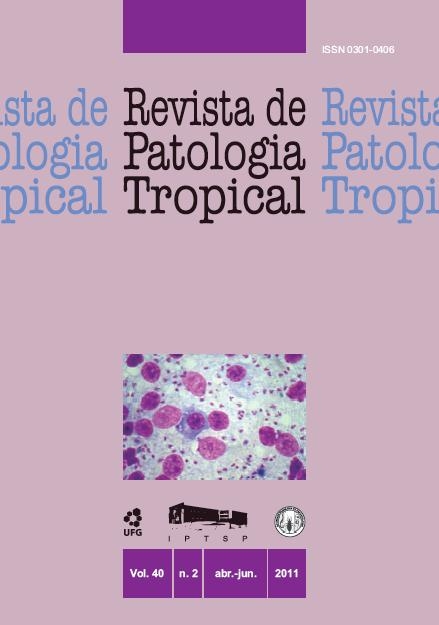Leptospiral agglutinins in pigs slaughtered for consumption and their association with hepatic and pulmonary impairment
DOI:
https://doi.org/10.5216/rpt.v40i2.14939Keywords:
Leptospirosis, Lung, Liver.Abstract
Leptospiroses are cosmopolitan zoonosis caused by spirochetes of the genusLeptospira. Over the past years, pigs have been implicated as reservoirs. This study
aimed to investigate anti-Leptospira spp. agglutinins in pig and the association of
lung and liver lesions in seropositive animals. We examined sera from 150 pigs by
microscopic agglutination test (MAT). Out of these, only seven were seropositive
to one or more Leptospira spp. serovar. Fragments of lung and liver of seropositive
animals and of the same number of seronegative animals were submitted for
histopathological evaluation and stained with hematoxylin-eosin (HE) and
immunoperoxidase technique (IPX). In the lungs, there was a significant difference
in the inflammatory infiltrate between seropositive and seronegative animals, but no differences were detected between lung lobes. Liver lesions were more discrete,
however, there was a significant difference between seropositive and seronegative
animals. Immunohistochemistry detected antigen of Leptospira spp. in lung and
liver tissues in both seropositive and seronegative animals. In the lungs, the antigen
was located in phagocytic cells of the interalveolar septum, vascular endothelium,
and alveolar epithelium. At the liver, antigen was present in hepatocytes and vascular endothelial and Kupffer cells. The results indicate that pigs slaughtered for human consumption in the Brazilian cities of Teresina (Piaui State) and Timon (Maranhao State) are infected with Leptospira spp. suggesting that these animals may be a source of infection for humans.
Downloads
Downloads
Published
How to Cite
Issue
Section
License
The manuscript submission must be accompanied by a letter signed by all authors stating the full name and email address, confirming that the material has not been published or is under consideration for publication elsewhere, and agreeing to transfer copyright in all media and formats for Journal of Tropical Pathology. The authors will not be paid for published articles. They are solely responsible for the content of those articles, even if the Editor holds the right to adjust them to the norms of the journal.
The reviewers will not be paid for the peer review process.

